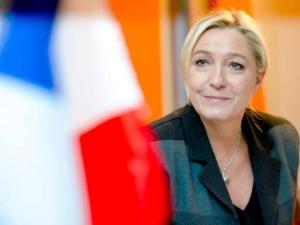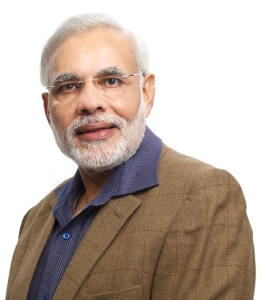Rise of the Right: India and France
Both in France and India support for nationalist parties has risen in the past election. In France, Front National (FN) had an incredibly successful election turn out with almost 25% in the French elections for the European Parliament; in India, Bharatiya Janata Party (BJP) represents the largest party in the national parliament. Both parties share religious overtones added to their nationalist sentiments. Jean-Marie Le Pen, founder of the FN, held overtly racist views. Today, his daughter Marine, while not overtly racist, maintains an anti-immigration policy to respond to what she views as the Islamization of France. The Muslim population of France has been growing since the post-World War II era; as of now, it accounts for approximately 10% of the population. Marine Le Pen skirts the issue of racism and maintains a secular platform by not targeting Muslims or Islam directly. Instead, she argues the crux of the issue is that Muslims impose their value system on the French.
Historically, the BJP has also been hostile towards the Muslim community, although today pockets of Muslims now turn to the BJP as a result of political disillusionment. The BJP shares ideological ties with the Rashtriya Swayamsevak Sangh (RSS), a controversial national volunteer program 40 million strong which espouses a nationalist and religious vision of India. Modi joined a RSS youth group as a child, and remained involved in the organization through university life and then as an activist. Modi’s victory has prompted fears that the RSS will gain too much clout and generate tension between Hindu and Muslim communities.
In addition, Modi’s past is marred by the Gujurat incident in February 2002, when Muslims in a Gujarati town set fire to a train carrying Hindu pilgrims, killing fifty nine people. Following the incident, Hindu groups retaliated by attacking Muslims; over 1,000 died and about 200,000 Muslims were displaced. However, Modi, who held the position of chief minister of Gujarat at the time, failed to respond to the riots. As a result, the United States revoked his visa in 2005. Nevertheless, Modi was never found guilty of a crime nor admitted to any wrongdoing. While the United States has since restored his visa, the shadow of Modi’s past remains. This year, only seven of 482 BJP candidates were Muslim, none of whom won, resulting in a Parliament with fewer Muslims than any since 1952. In addition, Modi has articulated anti-immigration rhetoric similar to that of Marine Le Pen. During a rally in Feburary, Modi called for Hindu migrants from Bangladesh to move back to India and for non-Hindus to be sent back to their home nations.
The appeal of the Front National and the BJP has grown exponentially as voters become disillusioned with political parties whose promises of change have borne little fruit. In France, both the UMP and the Socialist Party have faltered. According to the French Institute of Public Opinion, President François Hollande’s popularity fell to a record low in September: only 13% of French people express satisfaction with his performance. President Hollande’s approval rating reflects the dissatisfaction with his economic policy, which focuses on cutting state expenditures and tax breaks for companies. His desire to simultaneously continue his reform while stimulating growth prompted an internal crisis in August when Economy Minister Arnaud Montebourg publically called for a major overhaul of economic policy. Hollande has since formed a new government. However, the French remain frustrated with a stubbornly high unemployment rate, which reached 10.2% in Q2 of 2014.
The central rival to Hollande’s Socialist Party, the Union for a Popular Movement (UMP), has not been reinvigorated despite the failures of its competition. In May, the UMP was accused of illegal funding of Nicolas Sarkozy’s 2012 election campaign. The scandal reignited internal strife over UMP leadership and cast doubt on Sarkozy’s chances in the 2017 presidential election. Nicholas Sarkozy recently returned to political life to revive the UMP and address the threat of the Front National. However, his return was met with a lukewarm welcome; polls suggest about half of the French are unhappy with his return. This is partly due to the fact that some associate Sarkozy with elitists who support the increasingly unpopular European Union. The failures of the ruling Socialist party and the chaos of the UMP provide an ideal growing ground for the Front National.
Aside from the failures of the Socialist Party and the UMP, the Front National has gained prominence due to its platform. Francois Hollande connected the rise of the FN to “the fear of decline” and “relations with Islam”. The anti-European Union and anti-immigration policies of the FN appeal to voters concerned by these issues. While the platform may have appeal, many still hold back because of the stigma attached to the Front National’s extremist and racist history. Marine Le Pen has attempted to counter this stigma through a policy of dédiabolisation (de-demonization) and has threatened to sue anyone who calls the FN a far-right party.
Indians, too, have shifted to the right as an alternative to the shortcomings of other parties, particularly the Congress Party. The Congress Party has fallen out of favor largely due to a slowing economy and high inflation, in addition to high-profile corruption scandals. Indians have become tired of the Nehru-Gandhi political dynasty, and the Congress Party has failed to revive itself with any new leaders. Instead, it has looked to the fourth generation to take up the mantle. Rahul Gandhi, vice-president of the Congress Party, led the 2014 general election. In contrast to the charismatic Modi, Gandhi gives the impression that he is less eager for the spotlight. Thus, the Congress Party experienced a crushing defeat in the general elections this May, obtaining only 44 seats, less than 8% of the total. The BJP won a majority and thus formed the first non-Congress-party non-coalition government in Indian history. In addition, the BJP delivered another blow to the Congress Party last Sunday with state election victories in both Maharashtra and Haryana. The Congress Party had led Maharashtra and Haryana governments for the past 15 and 10 years, respectively.
Both the Front National and the BJP have gained momentum as potential saviors of failing economies; however, their leaders starkly contrast over economic policy. The Front National is hostile towards globalization and the European Union. It favors protectionist economic policies and abandoning the Euro as France’s currency. On the other hand, Modi’s prescription for India’s stagflation includes embracing the world economy. Modi has used the Sanskrit phrase vasudaiva kutumbakam, "the world is a family", and promoted India as prospective manufacturing center during his recent U.S. visit. Voters have high expectations for Modi, who is credited for Gujarat’s economic success.
The future success of the Front National and the BJP is far from certain. The Front National, although gaining momentum, has little chance of victory in the upcoming 2017 presidential election. The Socialist party and the UMP have indicated that they would form a coalition in the event that Marine Le Pen advances to the final round of voting. The BJP’s future success will likely depend on economic performance, in addition to Modi’s ability to lead a diverse country. India comprises many minority groups including the Muslim community; to govern effectively, the BJP must to be careful not to aggravate factional tensions.


